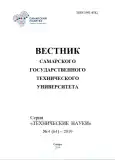Измерение эффективного значения периодического негармонического сигнала при наличии случайной помехи с использованием аппроксимационного метода
- Авторы: Ярославкина Е.Е.1, Суслов А.В.1, Козлов М.Ю.1
-
Учреждения:
- Самарский государственный технический университет
- Выпуск: Том 27, № 4 (2019)
- Страницы: 114-126
- Раздел: Приборостроение, метрология и информационно-измерительные приборы и системы
- URL: https://journals.eco-vector.com/1991-8542/article/view/21361
- DOI: https://doi.org/10.14498/tech.2019.4.%25u
- ID: 21361
Цитировать
Полный текст
Аннотация
В статье рассмотрен аппроксимационный метод определения эффективного значения периодического негармонического сигнала при наличии случайной помехи. Для решения поставленной задачи с целью оперативности получения результата используется обработка сигнала лишь на половине его периода. Предложенный метод базируется на параболической сплайн - аппроксимации дискретных значений сигнала. Определена погрешность сплайн - аппроксимации дискретных значений сигнала конкретного вида, а также погрешность аппроксимации при наличии случайной помехи с равномерным законом распределения. Приведен анализ погрешности определения рассмотренным методом эффективного значения, вызванной наличием случайной аддитивной помехи. Показано, что использование сплайн - функции снижает погрешность аппроксимации, вызванной случайной помехой. Определены характеристики рассмотренного метода при определении эффективных значений токов и напряжений промышленного силового электрооборудования. Рассмотрено использование предложенного метода при определении характеристик негармонического периодического сигнала с наличием третьей гармоники. Предложено использовать рассмотренный аппроксимационный метод измерения эффективного значения напряжения и тока мощного электрооборудования с целью оперативного определения его аварийных ситуаций.
Об авторах
Е. Е. Ярославкина
Самарский государственный технический университет
Автор, ответственный за переписку.
Email: Info@eco-vector.com
Россия
А. В. Суслов
Самарский государственный технический университет
Email: Info@eco-vector.com
Россия
М. Ю. Козлов
Самарский государственный технический университет
Email: Info@eco-vector.com
Россия
Список литературы
Дополнительные файлы







